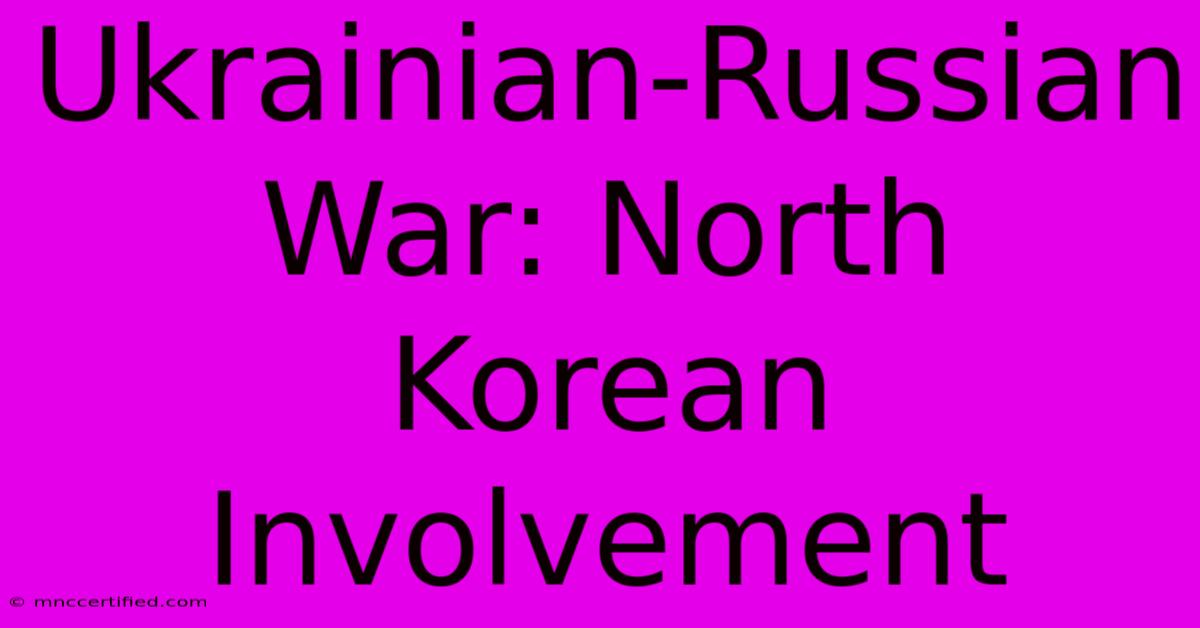Ukrainian-Russian War: North Korean Involvement

Table of Contents
Ukrainian-Russian War: North Korean Involvement – A Complex and Evolving Situation
The ongoing conflict between Ukraine and Russia has drawn international attention, and the involvement, or potential involvement, of seemingly disparate actors adds layers of complexity. One such actor is North Korea, whose role, though seemingly peripheral, warrants careful examination. This article will delve into the known and suspected involvement of North Korea in the Ukrainian-Russian War, analyzing its implications and future possibilities.
North Korea's Stated Support for Russia
North Korea has publicly voiced its support for Russia's position on the war, framing the conflict as a proxy war against the United States and its allies. This rhetoric aligns with North Korea's long-standing anti-Western stance and its pursuit of strategic autonomy. Statements from Pyongyang often condemn the West's actions, portraying Ukraine as the aggressor and echoing Russian narratives. This vocal support, however, doesn't tell the whole story.
Beyond Rhetoric: Evidence of Material Support?
While direct military intervention from North Korea is unlikely, evidence suggests a different form of involvement: the supply of military equipment. Reports, though often unverified, point towards North Korea providing artillery shells and other munitions to Russia. This alleged support, if confirmed, represents a significant development, bolstering Russia's military capabilities while simultaneously defying international sanctions placed on both countries. The exact scale and nature of any such transfers remain a subject of ongoing investigation and debate among intelligence agencies globally. Verification of these reports is crucial for understanding the full extent of North Korean participation.
Sanctions and International Implications
The potential supply of weaponry by North Korea carries significant international implications. Such actions constitute a blatant violation of United Nations Security Council resolutions imposing sanctions on North Korea due to its nuclear and ballistic missile programs. This further isolates Pyongyang on the world stage and risks escalating tensions with countries like the United States and South Korea. The international community's response to any confirmed evidence of arms transfers will be critical in shaping the future trajectory of the conflict and North Korea's international relations.
The Geopolitical Chessboard: North Korea's Strategic Calculations
North Korea's actions must be viewed through the lens of its own strategic interests. By supporting Russia, Pyongyang seeks to:
- Strengthen ties with a key ally: Russia provides North Korea with crucial diplomatic support and access to essential resources.
- Diversify its international relationships: Reducing reliance on China, its primary economic partner, through closer ties with Russia is strategically advantageous.
- Challenge the international order: By defying sanctions and supporting Russia, North Korea undermines the authority of the United Nations and the Western-led international order.
Uncertain Future: Ongoing Analysis and Monitoring
The extent of North Korean involvement in the Ukrainian-Russian War remains an evolving narrative. Independent verification of reported arms transfers and a thorough analysis of Pyongyang's strategic motivations are crucial for a comprehensive understanding of the situation. Continued monitoring of intelligence reports, diplomatic actions, and economic exchanges between North Korea and Russia is essential for anticipating future developments. This conflict highlights the complex interplay of global politics and the unpredictable nature of international relations in the 21st century. Further research and analysis will undoubtedly shed more light on North Korea's role in this protracted and multifaceted war.
Keywords: Ukrainian-Russian War, North Korea, Russia, Ukraine, sanctions, military aid, international relations, geopolitical analysis, arms transfers, Pyongyang, UN Security Council, international sanctions, military equipment, artillery shells, strategic autonomy.

Thank you for visiting our website wich cover about Ukrainian-Russian War: North Korean Involvement. We hope the information provided has been useful to you. Feel free to contact us if you have any questions or need further assistance. See you next time and dont miss to bookmark.
Featured Posts
-
Korean Troops Deployed To Kursk
Nov 19, 2024
-
Giants Sideline Jones Skip 23 M Guarantee
Nov 19, 2024
-
Spirit Airlines Broward Bankruptcy News
Nov 19, 2024
-
Dune Prophecy Review Bracing Sci Fi
Nov 19, 2024
-
Snow And Ice Midlands Weather Warning
Nov 19, 2024